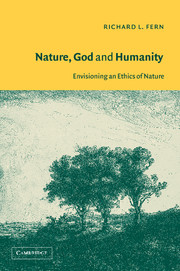1 - Moral concerns
Published online by Cambridge University Press: 22 September 2009
Summary
POSING THE QUESTION
That we ought to care about nature is evident. Wild nature has unparalleled instrumental value – the water we drink, the air we breathe, the silicon chips we rely on. Human life cannot be sustained, let alone achieve well-being, apart from the multifold goods of wild nature. In addition, independent of its contribution to other goods, wild nature itself has value for us – mountain lions and otters, rivers and towering mountains, the wind blowing through pine trees. Even if we left this world to live on self-sustaining star-ships, wild nature would retain this intrinsic value for those who knew and remembered the wonders of earth.
That wild nature has this value makes it an obvious indirect object of moral concern relative to the good of humans. These concerns may be large – involving the devastation of an entire continent – or small – involving a town's hesitancy to share access to its beach with land-locked others. Such issues arise because natural goods and ills, weal and woe, are unevenly distributed and, on occasion, unfairly appropriated. The colonizing power, state or business, that extracts natural resources without consent or recompense acts unjustly. Even with consent and fair recompense, parties to “the deal” may act unjustly with regard to humans not-yet-present at the table, the posterity to whom they leave a world depleted of value.
- Type
- Chapter
- Information
- Nature, God and HumanityEnvisioning an Ethics of Nature, pp. 11 - 38Publisher: Cambridge University PressPrint publication year: 2002

